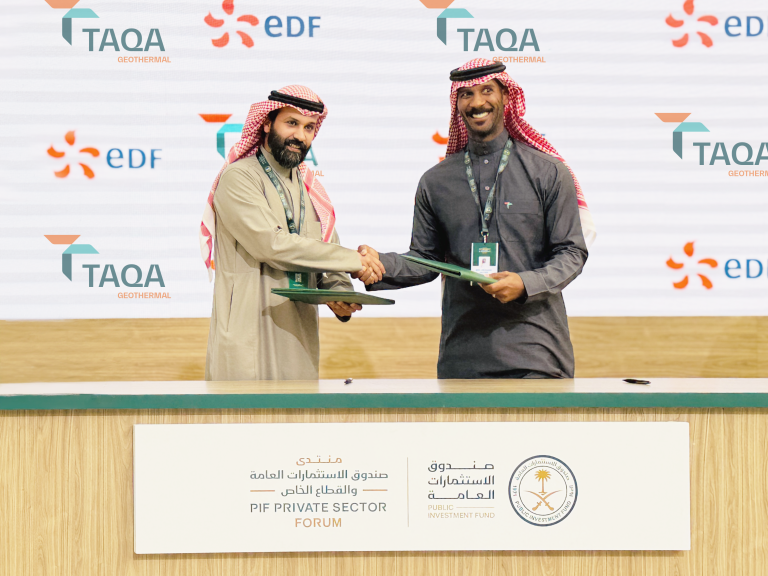EDF and TAQA Collaborate on Geothermal Energy in Saudi Arabia
Hyphen Web Desk

Omar Aldaweesh, CEO of EDF Saudi Arabia, and Meshary Al-Ayed, CEO of TAQA Geothermal Energy Company, signed the Memorandum of Understanding , marking the latest step in a deepening collaboration between the two companies. The agreement is expected to foster groundbreaking solutions for decarbonising the energy sector, aligning with Saudi Arabia’s vision to enhance its renewable energy capacity.
TAQA, a leading player in the region’s energy sector, has set its sights on advancing geothermal energy as part of its broader strategy to diversify its energy mix. With this agreement, the company seeks to tap into new, sustainable energy resources, as geothermal energy presents an untapped potential for the Kingdom. The partnership with EDF, a major global energy provider, is a clear signal of Saudi Arabia’s growing commitment to achieving its ambitious climate goals and strengthening its position as a regional leader in sustainable energy solutions.
Geothermal energy, which harnesses heat from the Earth’s interior, is gaining traction as a stable and renewable energy source that can complement other forms of green energy like wind and solar. As countries around the world accelerate their transition to cleaner energy, the Kingdom is keen to explore all viable options to diversify its energy portfolio, reduce its reliance on oil, and meet net-zero emissions targets. This partnership with EDF and TAQA is central to this goal.
The focus of the collaboration will be to identify, develop, and implement innovative geothermal energy technologies that can be deployed in Saudi Arabia, particularly in remote or challenging environments where conventional energy sources may not be feasible. Given the Kingdom’s vast, largely untapped geothermal potential, the collaboration aims to explore new ways to harness this resource efficiently while ensuring minimal environmental impact.
Alongside geothermal power generation, the deal will also see the development of HVAC applications, which are particularly relevant in a climate like Saudi Arabia’s. The combination of geothermal heat pumps for cooling and heating could not only offer a more sustainable solution to the country’s energy needs but also contribute to lowering energy consumption in residential and commercial buildings.
Compressed air energy storage, another focal point of the agreement, is also viewed as a promising technology. This method stores energy in the form of compressed air and can provide grid stability by acting as a buffer to smooth out fluctuations in renewable energy generation, such as those caused by changes in wind or sunlight. As the Kingdom moves towards integrating more renewable energy into its grid, such technologies could prove essential in balancing supply and demand.
The timing of this agreement coincides with Saudi Arabia’s efforts to reshape its energy sector under the framework of its Vision 2030 initiative, which aims to reduce the country’s dependence on oil and promote more sustainable energy sources. Geothermal energy, with its ability to provide consistent and reliable power, is seen as an important component of this transformation.
While geothermal energy has already been successfully utilised in various parts of the world, including the United States, Iceland, and Kenya, its application in the Middle East remains limited. However, Saudi Arabia’s geographic positioning, with its tectonic plate boundaries and volcanic activity, offers significant potential for geothermal exploration. The collaboration between EDF and TAQA aims to leverage this untapped resource by driving technological advancements and overcoming existing barriers to geothermal energy adoption in the region.
At the PIF Private Sector Forum, a prominent gathering of government officials, business leaders, and investors, the MoU was hailed as a milestone in the Kingdom’s journey towards energy diversification. The forum serves as a platform for discussions on how to accelerate private sector engagement in the Kingdom’s energy transformation and other sectors vital to its economic development.
The partnership between EDF and TAQA also highlights the increasing role of multinational companies in driving innovation within the Kingdom’s energy landscape. EDF, with its extensive experience in geothermal energy, is well-positioned to support TAQA in achieving its goals, while also contributing to Saudi Arabia’s broader clean energy ambitions.
For Saudi Arabia, this strategic agreement represents another step forward in its ambitious energy transition strategy, which includes an array of projects aimed at expanding its renewable energy capacity. This partnership will undoubtedly play a significant role in diversifying the Kingdom’s energy mix and reducing its carbon footprint in line with international sustainability goals.
Labels:
#Syndication
Share:
